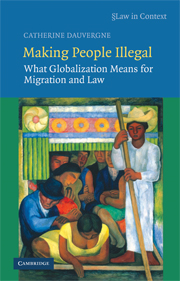Book contents
- Frontmatter
- Contents
- Acknowledgments
- Publication acknowledgments
- 1 Introduction
- 2 On being illegal
- 3 Migration in the globalization script
- 4 Making asylum illegal
- 5 Trafficking in hegemony
- 6 The less brave new world
- 7 Citizenship unhinged
- 8 Myths and Giants: The influence of the European Union and the United States
- 9 Sovereignty and the rule of law in global times
- Bibliography
- Index
- The Law in Context Series
- References
3 - Migration in the globalization script
Published online by Cambridge University Press: 05 June 2012
- Frontmatter
- Contents
- Acknowledgments
- Publication acknowledgments
- 1 Introduction
- 2 On being illegal
- 3 Migration in the globalization script
- 4 Making asylum illegal
- 5 Trafficking in hegemony
- 6 The less brave new world
- 7 Citizenship unhinged
- 8 Myths and Giants: The influence of the European Union and the United States
- 9 Sovereignty and the rule of law in global times
- Bibliography
- Index
- The Law in Context Series
- References
Summary
The intertwining of sovereignty and illegal migration presented in Chapter 2 is intelligible against a backdrop of the changes that have accompanied the recent era of globalization. This chapter is devoted to demonstrating why migration law is an ideal setting for understanding and testing the nature of globalization. In order to do this, I examine two relationships. The first is that of globalization and the law and the second is that of nation and migration. The increasing focus on migration regulation, resulting in heightened attention to illegal migration, is situated at the intersection of these two relationships.
The argument proceeds by first considering globalization. To make sense of the burgeoning literature of globalization, I isolate four central concerns that permeate discussions of globalization. The next step is to consider where migration law fits into the story of how law writ large is situated within globalization. This involves solving the riddle of how migration can be viewed as a paradigmatic global event yet migration law can have little role in legal conceptualization of globalization. Having canvassed the terrain in these two areas, the chapter then turns to explaining why migration law is an ideal laboratory for observing globalization because of how it relates to the central debates of the theoretical cacophony about globalization. This requires a reexamination of the traditional role migration law has played over the past century and the specific challenges that the contemporary pace and nature of change bring to this role.
- Type
- Chapter
- Information
- Making People IllegalWhat Globalization Means for Migration and Law, pp. 29 - 49Publisher: Cambridge University PressPrint publication year: 2008

